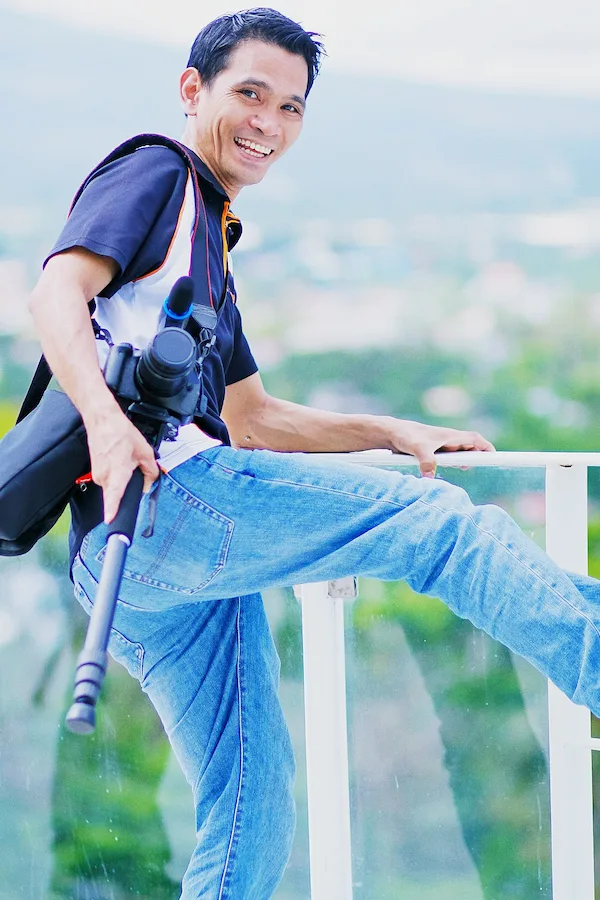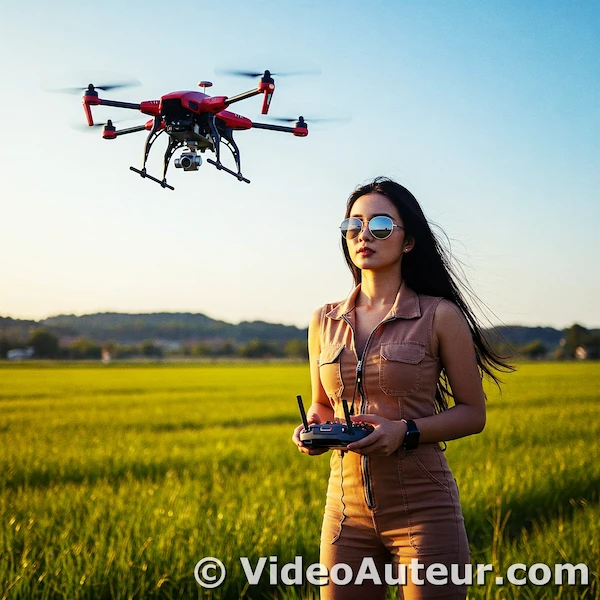Production Process Elements Help You Communicate Thru Video
Knowing the elements in the production process empowers us to communicate and connect.
These elements make us feel we’re on the right road to making videos.
Here's a simple (and humble) diagram of the Elements in the Production Process. (Sorry for my bad drawing. ;-) )

The elements I’m talking about are...
1. You...
2. The content of your video...
3. Your intended viewer...
4. Her feedback about your video.
I subdivided “video content” into sub-elements...
- The type of video
- Its presentation
- The tools of production you use to make a video.
A Road Map for All Our Efforts
The journey of creating a video from start to finish, can be
scary and confusing. But with a road map in our hands, we have a clear direction for all our creative
and production efforts.
My quick
explanation for that diagram (or road map) is this...
- You
make a video for your intended viewer.
And she gives you feedback about it.
- When you make a video, you focus on its content.
- The type of video, its presentation and the tools of production serve the content. Not the other way around.
You may ask how I came up with this
kind explanation...
The thing is, I only learned it after years of making videos... when I decided
to look closely at what it is I really
do.
But I wish I’ve known it earlier...
Let’s zoom in on each basic element.
Production Process Element 1: You
Communication through video starts with you.
Yes, it may be prompted by the video topic. (Is it a birthday celebration, a wedding, another real-life event, or any other subject?)... But the ideas and materials you communicate will come from...
(I told you, we’ll zoom in on each element. ;-) )
The key to discovering what you will communicate in video,
is to be honest about...
- Why you want to do a particular video--your personal intent
- How you feel about the subject--your fascination.
Earning money could be your intent. But try to dig deeper. For example, “Do you really care about producing an engaging video? Do you want to feel successful in doing so?”
Personally, I really care about engaging my viewer. And I feel happy knowing that I connected with her in my own little way.
Your fascination for the subject, will give you a deeper motive for pursuing it. For example, if it’s a wedding video, “How do you feel about the idea of marriage? Do you believe in it?”
In my case, I shoot weddings because I believe in marriage. If not, I’ll find it hard to make wedding videos.
But the kind of marriage that I believe in--and like to shoot--is “marriage out of love”, not marriage prompted by business or political ambitions.
Production Process Element 2: Intended Viewer
Your intended viewer receives what you communicate via video.

She’s the one you want to connect with. So, always consider
her in the production process. How?
Whatever you do in
your video, needs to align with your viewer’s concerns and needs.
For example, if your project is a wedding video, your
intended viewer is the couple. So, be sure to include moments that matter to
them--even if those moments don’t matter to you a lot.
If the couple prefers a simple, yet touching video, over a highly-stylized
one... give it to them.
Production Process Element 3: Video Content
Video content is what you communicate to your intended viewer.
It represents your ideas and feelings. It reflects your attitude about the subject. It shows your treatment of materials. In other words...
Video content is the expression of your exciting worldview.
There are sub-elements that help your content, speak to your viewer...

Type of Video
Type of video is some sort of “packaging”, that applies to your viewer’s concerns. Why?
Because that
is what your intended viewer is looking for. Is it a family video that she wants? An event video? A corporate
video? A documentary video? A music video?
Also, the type of video may have a certain “look”, that is associated with it. A kid’s birthday party video may have more saturated colors. A corporate video, on the other hand, may have more subdued colors.
Presentation
Presentation is how your ideas flow... and how you arrange
your materials in video.
The flow of ideas
and the arrangement of materials,
need to appeal and make sense to your viewer. Why?
Because your presentation reflects her overall viewing experience.
Production Tools
Production tools are the gear... the equipment ...the software
that many are excited about! ;-) Tools enable us to produce videos.
But they need to serve the content of the video...
not the other way around.
Switching the order will just throw you off, in the game of communication. In other words...
- obsessing with gear,
- overlooking the viewer, and
- ignoring the content
... will just result in a video, that looks magnificent, but fails to connect.
Production Process Element 4: Feedback
Feedback is your viewer’s reaction to your video content.

Her reaction indicates, if she felt engaged... and if you
communicated well via video.
How to Benefit from the Road Map?
Whenever you have a project (big or small), make your life easier by looking at the road map.
The big picture insight it offers, keeps you on the right track. It compels you to focus on your biggest priorities, when making videos...
- First, your intended viewer.
- Then,
the video content, that you will design and produce for her.
Avoid This Trap...
Do you wonder why many obsess with gear and software, when
these tools are just sub-elements, that
serve the video content?
You’re right! They lose sight of that big picture—or have no vision of it at all. They don’t know where to position and blow their efforts, to make compelling videos.
Worse, others seem to think, that having expensive gear will guarantee quality and success.
—
There’s a reason we hear this: “Expensive gear alone won’t make you a better shooter.”
Great leaps in technology opened doors for the “Everyman” to avail video and audio equipment, that were then only afforded by the big players in the industry.
Video creation gadgets and video production software are growing in numbers. But, are we also seeing compelling and meaningful videos growing in numbers?
—
Yes, love your gear because it allows you to make videos, in
the same way, that oil and canvas allow a painter to paint pictures.
But, don’t fall into the trap of being so enamored of gear, that you lose sight of the big picture—what you need to do in the production process...
Communicate and connect with your audience... through video.
Your intended viewers are far
more important than your gear—however expensive it may be.
And the success of your video depends on how well you considered... and felt... the basic elements in the production process.
This "big picture" of the elements in video production process, has guided the making of this short video...
"Ayie and Rona"












